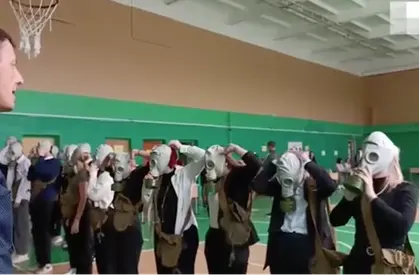Russia held two days of “nuclear war” drills in all regions across Russia’s 11 time zones starting on Tuesday. Although similar drills have been conducted annually within individual districts and regions, this is, according to Newsweek, the first time an exercise of this scale has been held simultaneously countrywide.
The announcement for the exercises came shortly after Mikhail Kovalchuk, head of Russia’s Kurchatov nuclear energy research centers suggested that the Kremlin should stage a nuclear weapons test in the Arctic Ocean as a show of force to the West.
JOIN US ON TELEGRAM
Follow our coverage of the war on the @Kyivpost_official.
He drew comparison with the Soviet Union’s 1961 detonation of the “Tsar Bomba,” the most powerful nuclear weapon that existed, on the Novaya Zemlya archipelago.
President Vladimir Putin reportedly ordered the wide-scale drills due to the “growing danger of armed conflicts including [with] nuclear-capable powers near Russia’s borders using long range weapons including unmanned aerial and watercraft.” The aims of the exercises were to test rescue workers’ ability to evacuate large numbers of people from areas affected by radioactive fall-out.
The document outlining Russia’s civil nuclear defense drill warned:
“The threat to the safety of the population is posed by the risk of the use by the enemy of modern long-range means.”
The scenario

Russian Soldier Suspected of Holding Ukrainian Woman in Sexual Slavery
According to leaked documents published by Russian media outlet Baza, which has links to Moscow’s security services, the nationwide exercise was necessary because of “the risk of armed conflicts escalating into local and regional wars, including those involving nuclear powers, is increasing.”
The exercise situation foresaw a widescale nuclear attack from the West as a result of which martial law and full mobilization had been declared. The attack had seen complete destruction of life support systems, including housing in up to 70% of the country with large areas being identified as zones of radioactive contamination.
While there was little information of how many “civilian players” were involved, “all civil defense assets” were reportedly being tested. Civil defense leaders and the heads of key state corporations had been ordered to participate.
In the event of a real nuclear war situation Putin would be expected to take control, probably from one of the multiple nuclear bunkers that are known to exist in his palaces or from one of his fleet of “Doomsday” Ilyushin Il-80 “Maxdome” airborne command and control aircraft.
Ilyushin Il-80 Maxdome seen as part of Moscow fly-past in 2010
Photo from Twitter
It was unclear if Putin played any active role in the training exercise, command and oversight of which was devolved to the emergencies minister Alexander Kurenkov, who said: “The main goal of the drills is to check our readiness for specific actions.”
What happened during the exercise?
The exercise kicked off with the blaring of sirens and the message:
“Attention, everyone! This is a check of the readiness of the warning system to the population. Please remain calm!”
TV pictures showed emergency services being deployed wearing hazmat suits, and in one scene a group ran from a building with a dummy on a stretcher.
In some areas, schoolchildren drilled how to wear gas masks, while officials elsewhere were forced into bunkers.
Footage showed two fallout shelters being opened in Volgograd, the city formerly known as Stalingrad, one of which was supposedly able to accommodate up to 36,000 people. It showed access being controlled by police as Russian officials were directed into the shelters.
Screenshot of controlled access to a nuclear fallout bunker
Public warnings in Russia, US and others
As part of its exercise Russia carried out tests of its wider public warning system on Wednesday. Along with blaring sirens, television and radio broadcasts were interrupted as part of a new initiative that requires authorities to conduct such tests twice a year, with the aim of checking the readiness of warning systems and raising public awareness in the event of a threat or emergency.
Some commentators say both the exercises and tests were aimed primarily at instilling fear in the population, reinforcing support for Putin’s so-called special military operation in Ukraine, and further cracking down on domestic dissent in preparation for the 2024 presidential elections.
Irina Tsukerman, a national security lawyer and geopolitical analyst told the US Daily Express: “Putin is not seriously concerned about possibility of a nuclear or other major scale attack by NATO.”
She said Ukrainian drone attacks on buildings in Moscow and elsewhere do not warrant such major preparations across the country and that “the practice of martial law is particularly useful as Putin continues to crack down and isolate Russia from external influence.”
The US also conducted a large-scale test of its public warning systems on Wednesday, which it claimed were coincidental. The US test was said to ensure the effectiveness of alerting the public to any national emergencies, not just nuclear-related, through messages to mobile phone and TV and radio stations, particularly at the national level.
Several other countries including the UK have conducted similar alert system tests in recent months to emphasize the importance of preparedness in times of crises and disasters.
You can also highlight the text and press Ctrl + Enter












